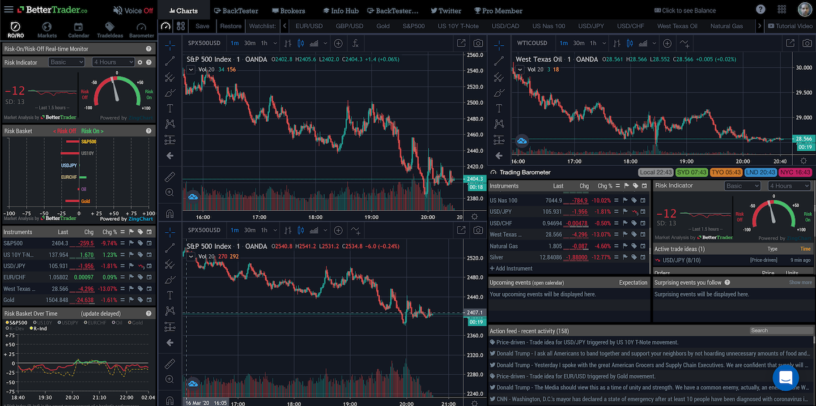Forex, often referred to as the foreign exchange, FX or trading currency, is a global market where currencies trade. Forex trading has emerged as a popular career due to its 24/7 schedule, easy access and high liquidity. While being your own boss and making money on a personal device when it’s convenient for you is enough motivation to consider forex trading as a career, like everything else, forex trading has its advantages and disadvantages.
What are the Advantages of Forex Trading?
1. Low Costs
In terms of brokerage and commission, forex trading can have very low costs and that’s because there aren’t really commissions. Most brokers profit from the spreads between currencies. Contrastingly, equity or other security traders must take such fees into account because the brokerage structure varies.
2. Accommodates Multiple Trading Styles
To short-term traders, who usually take positions over short durations, forex trading is very advantageous because the forex market is open all day and enables trades at your convenience. For instance, a U.S. based trader may trade the Australian dollar during U.S. business hours because there is little development expected and prices are somewhat stable during Australia’s ‘off hours’. Such traders adopt high volume, low-profit trading strategies. This is because they have little profit margins due to minimal developments specific to forex trading.
These traders try to profit on relatively stable low volatility duration and compensate with high volume traders. Furthermore, traders can take long term positions which can last from days to weeks, which attests to the convenience of forex trading.
3. High Liquidity
The forex market has the largest number of market participants compared to other financial markets. As a result, it provides the highest level of liquidity and allows for large currency orders to easily be filled out without deviating largely in price. This mitigates the possibility of price manipulation and price anomalies, enabling tighter spreads that lead to more efficient pricing. With forex trading, traders don’t need to worry about opening and closing volatility or standing price rangers during the afternoon.
4. No Regulator or Central Exchange
As on over the counter market operating across the globe, there is no regulator or central exchange for the forex market. Occasionally, as needed, countries’ central banks interfere, but this only occurs under extreme conditions and is very rare. Most developments are already factored into the market, and with such a decentralized and deregulated market, sudden surprises are avoided.
Contrastingly, in an equity market, a company can suddenly declare a dividend or report huge losses causing a huge price change. Furthermore, such decentralization helps keep costs low. Brokers receive direct orders and execute them on their own. Moreover, with a deregulated market, traders have the ability to short positions – something that isn’t allowed for a few asset classes in other markets.
5. High Volatility
High volatility is a trader’s best friend. With major currencies, large price swings happen quite frequently. If/when positioned properly, high volatility enables major profit opportunities to traders.
6. Capital Requirements are Low
Due to tight spreads in terms of percentage in price, one can easily start trading in the forex market with minimal amounts of capital. This does not necessarily hold true in other markets. Furthermore, the ability of margin trading with a high leverage factor enables traders to profit with limited capital.
7. Ease of Entry
There are several analysis theories and tools for long term forex trading, as well as hundreds of forex technical indicators to draw on for short term forex traders. This generates tremendous autonomy for traders with varying levels of experience to make a prompt entry into forex trading.
What are the Disadvantages of Forex Trading?
1. Lack of Transparency
Because of the deregulated nature of the forex market dominated by brokers, traders are trading against professionals. Being broker-driven means that the forex market may not be fully transparent. That being said, it’s possible a trader has no control on how his trade order gets filled, they may not get the best price, and can even get limited views on trading quotes.
A simple solution to this is to only get involved with regulated brokers who fall within the purview of broker regulations. The market may not be under the control of the regulators, but the activities of brokers are.
2. Complex Price Determination
Forex rates can be difficult to analyze and draw reliable conclusions to trade on because they are influenced primarily by global politics or economics. The primary reason there is high volatility in forex markets is due to the fact that most of the trading happens on technical indicators, and getting the technicals wrong will result in a loss.
3. High Risk, High Leverage
With forex trading, a high level of leverage is available. A ratio of 50:1 is allowed, meaning that for every $50 worth of a forex position, a trader only needs $1. While traders can largely benefit from leverage, it also magnifies potential losses. That being said, it’s crucial to have a robust knowledge of leverage, strong control over their emotions, the ability and willingness to cut losses short, and an efficient capital allocation scheme.
Forex trading carries a lot of risks, and no trader should be gambling their capital away. For testing and practice purposes, register a demo account with your preferred broker and test your skills ensuring you understand the market and its movements.
4. Self Motivated Learning
Unlike other markets where traders can seek professional help from portfolio managers, trade advisors or even relationship managers, forex traders are on their own. As a forex trader, you need to be intellectually curious and constantly maintain a disciplined and self-directed learning process.
5. High Volatility
Traders can easily suffer from huge losses in the highly volatile forex market. The 24/7 market availability makes it hard to regularly monitor prices and volatility. The best approach is to keep strict stop losses and trade systematically through a well thought out strategy.
Conclusion
A career as a forex trader can be convenient, engaging and profitable, however with every advantage comes a disadvantage that needs to be considered, there is a steep learning curve and forex traders face high risks, leverage and volatility. To be a successful forex trader, you need the continuous thrust for knowledge, efficient capital management techniques, the ability to take risks and not let your emotions cloud your judgment, as well as a thorough trading plan.

















